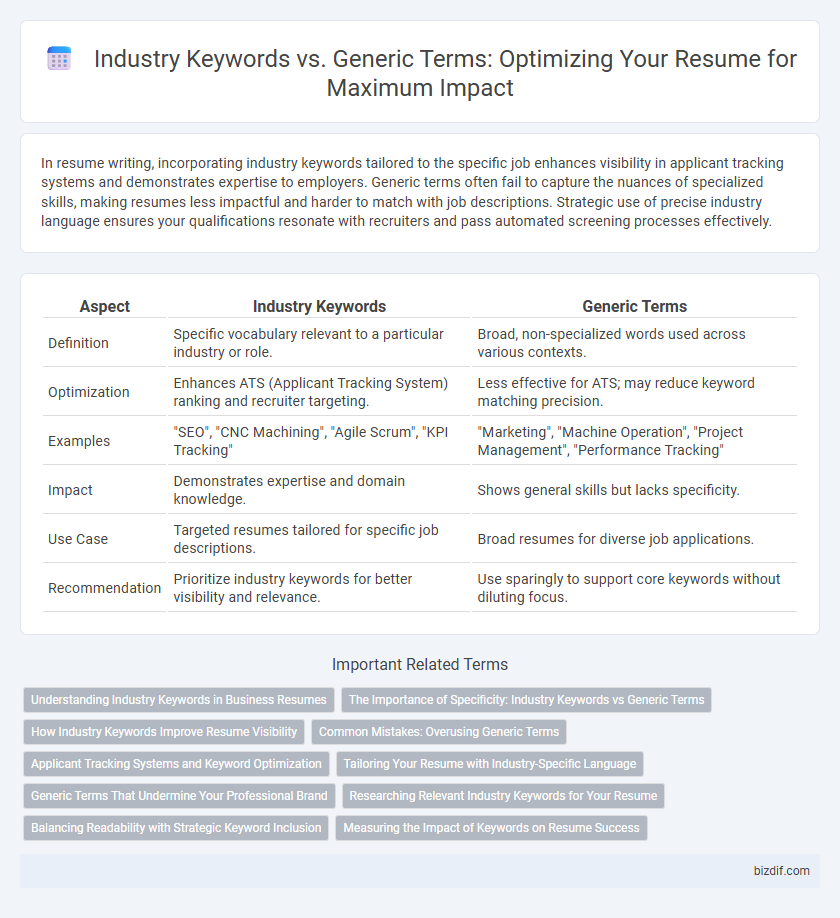In resume writing, incorporating industry keywords tailored to the specific job enhances visibility in applicant tracking systems and demonstrates expertise to employers. Generic terms often fail to capture the nuances of specialized skills, making resumes less impactful and harder to match with job descriptions. Strategic use of precise industry language ensures your qualifications resonate with recruiters and pass automated screening processes effectively.
Table of Comparison
| Aspect | Industry Keywords | Generic Terms |
|---|---|---|
| Definition | Specific vocabulary relevant to a particular industry or role. | Broad, non-specialized words used across various contexts. |
| Optimization | Enhances ATS (Applicant Tracking System) ranking and recruiter targeting. | Less effective for ATS; may reduce keyword matching precision. |
| Examples | "SEO", "CNC Machining", "Agile Scrum", "KPI Tracking" | "Marketing", "Machine Operation", "Project Management", "Performance Tracking" |
| Impact | Demonstrates expertise and domain knowledge. | Shows general skills but lacks specificity. |
| Use Case | Targeted resumes tailored for specific job descriptions. | Broad resumes for diverse job applications. |
| Recommendation | Prioritize industry keywords for better visibility and relevance. | Use sparingly to support core keywords without diluting focus. |
Understanding Industry Keywords in Business Resumes
Industry keywords in business resumes are specific terms, jargon, and skills that align directly with the targeted sector, such as "market analysis," "profit margin optimization," or "supply chain management." Incorporating these precise keywords improves applicant tracking system (ATS) compatibility and demonstrates industry expertise to hiring managers. Generic terms like "teamwork" or "communication" lack the specificity needed to showcase relevant business acumen and may reduce the resume's impact in competitive job markets.
The Importance of Specificity: Industry Keywords vs Generic Terms
Utilizing industry keywords in a resume enhances applicant tracking system (ATS) compatibility by matching job-specific terminology recruiters seek, increasing chances of passing initial screenings. Generic terms often dilute the candidate's expertise, failing to showcase specialized skills relevant to the targeted role. Precise language tailored to the industry highlights professional competence and aligns the resume with employer expectations.
How Industry Keywords Improve Resume Visibility
Incorporating industry-specific keywords into a resume significantly enhances its visibility during Applicant Tracking System (ATS) scans, increasing the chances of passing initial automated screenings. These targeted terms align with job descriptions and recruiter searches, making the resume more relevant and likely to appear in search results. Using generic terms often fails to capture the precise skills and experiences employers seek, reducing the resume's overall effectiveness in competitive job markets.
Common Mistakes: Overusing Generic Terms
Overusing generic terms such as "team player" or "hard worker" dilutes the impact of a resume and fails to capture industry-specific skills. Recruiters prioritize resumes featuring industry keywords like "SEO optimization," "data analysis," or "project management," which demonstrate relevant expertise. Incorporating precise terminology aligned with the targeted job description enhances visibility in applicant tracking systems (ATS) and increases chances of interview invitations.
Applicant Tracking Systems and Keyword Optimization
Industry keywords significantly improve the chances of passing Applicant Tracking Systems by matching the specific terminology used in job descriptions, whereas generic terms often get overlooked due to their broad and non-specific nature. Optimizing resumes with precise industry-relevant keywords enhances visibility and relevance, increasing the likelihood of being shortlisted by automated screening tools. Using specialized keywords aligned with the target role ensures applicants stand out in competitive job markets and enhances the effectiveness of keyword optimization strategies.
Tailoring Your Resume with Industry-Specific Language
In resume writing, tailoring your resume with industry-specific language significantly enhances its relevancy and visibility to hiring managers and applicant tracking systems (ATS). Using precise industry keywords such as "agile methodology" for IT, "cash flow management" for finance, or "supply chain optimization" for logistics demonstrates your expertise and aligns your skills with job requirements. Avoid generic terms like "team player" or "hard worker," which dilute your impact and fail to capture the specific competencies sought in your field.
Generic Terms That Undermine Your Professional Brand
Using generic terms like "hardworking," "team player," or "detail-oriented" can undermine your professional brand by failing to showcase specific skills or achievements relevant to your industry. Industry-specific keywords such as "data analysis," "project management," or "software development" improve your resume's visibility in applicant tracking systems and demonstrate your expertise. Tailoring your language to reflect sector-specific competencies strengthens your professional identity and enhances your chances of landing interviews.
Researching Relevant Industry Keywords for Your Resume
Incorporating relevant industry keywords into your resume significantly enhances its visibility to applicant tracking systems (ATS) and recruiters, aligning your skills with specific job requirements. Researching keywords involves analyzing job descriptions, industry publications, and professional profiles to identify terms that reflect current trends and employer priorities. Using precise industry jargon and technical terms ensures your resume resonates with hiring managers and increases the likelihood of securing interviews.
Balancing Readability with Strategic Keyword Inclusion
In resume writing, incorporating industry-specific keywords enhances ATS (Applicant Tracking System) compatibility and improves the chances of passing automated screenings. Balancing these strategic keywords with clear, concise language ensures the resume remains readable and engaging to human recruiters. Effective resumes blend targeted terminology with straightforward descriptions to maximize both algorithmic ranking and professional appeal.
Measuring the Impact of Keywords on Resume Success
Incorporating industry-specific keywords significantly increases a resume's visibility by improving compatibility with Applicant Tracking Systems (ATS), which scan for relevant terms. Data shows resumes containing targeted industry jargon have a 30% higher chance of being shortlisted compared to those using generic terms. Measuring keyword impact involves tracking interview callback rates and ATS pass-through statistics to optimize resume content effectively.
Industry Keywords vs Generic Terms Infographic

 bizdif.com
bizdif.com